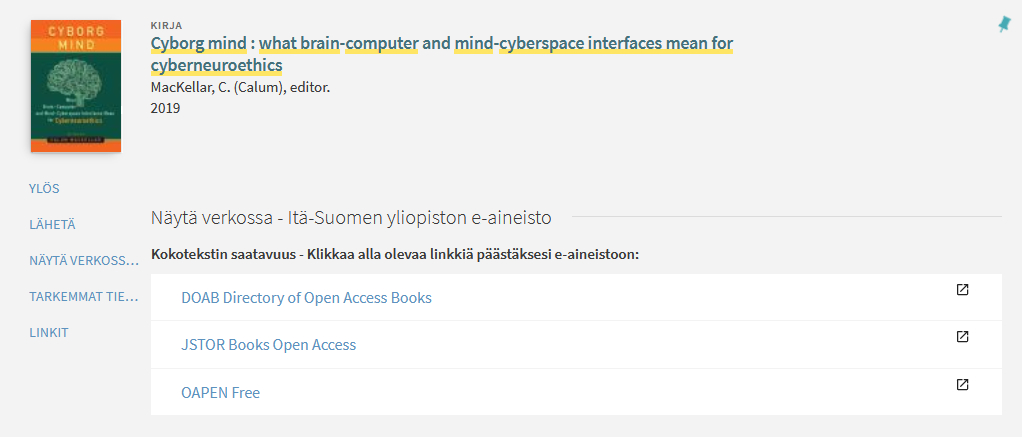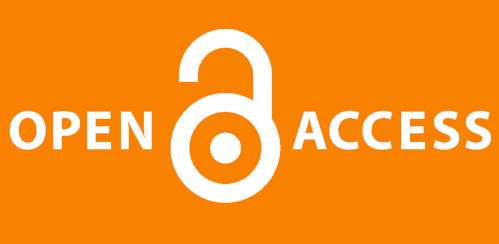Open Access -kirjat UEF-Primossa | Open Access books in UEF Primo
(Please, scroll down to read in English.)
Oletko miettinyt miten avoimesti saatavilla olevat eli Open Access -kirjat tulevat näkyviin UEF-Primoon? Tai paljonko UEF-Primo pitää sisällään näitä OA-kirjoja? Tässä blogikirjoituksessa kurkistetaan OA-kirjojen taustalla lymyäviin kokoelmiin ja niiden sisältöihin.
Mistä OA-kirjat tupsahtavat UEF-Primoon?
Suurin osa UEF-Primosta löytyvistä OA-kirjoista on peräisin kirjastojärjestelmätoimittajamme Ex Libriksen niin sanotuista Community Zone -kokoelmista. Kokoelmia on sekä maksullisille että avoimesti saatavilla oleville aineistoille. OA-kirjakokoelmia on UEFissa aktivoitu Primoon löydettäviksi karkeasti jaoteltuna kahdenlaisia: kustantajakohtaisia kokoelmia ja eri kustantajien OA-kirjoja kokoavia kokoelmia.
UEF-Primossa kunkin teoksen kohdalla voit nähdä, mistä kokoelmasta kirja on peräisin. Nimekkeen taustalla olevat kokoelmat näkyvät listauksena ”Näytä verkossa – Itä-Suomen yliopiston e-aineisto” -otsikon alla. Kuvan 1 kirja löytyy siis sekä DOABin, JSTORin että OAPENin kokoelmien kautta. Jokaisen kokoelman nimi muodostaa myös linkin itse aineistoon kyseisessä palvelussa.

OA-kirjapalvelut
Suurin osa UEF-Primosta löytyvistä OA-kirjoista on peräisin kahdesta suurimmasta monitieteisestä OA-kirjapalvelusta: DOABista (Directory of Open Access Books) ja OAPENista (Open Access Publishing in European Networks). OAPEN toimii OA-kirjojen tallennusalustana, kun taas DOAB kokoaa yhteen eri alustoilla tallennettuja OA-kirjoja. Lähes kaikki OAPENista löytyvät kirjat löytyvät myös DOABista, mutta koska eroavaisuuksiakin näiden kokoelmien väliltä löytyy, meille on aktivoitu molemmat palvelut. Molemmista palveluista löytyy myös suurin osa kustantajien omien OA-kirjakokoelmien nimekkeistä. DOABin kautta löytyy UEF-Primosta tällä hetkellä noin 33 540 nimekettä ja OAPENin kautta reilut 20 200 kirjaa.
Suurimpien OA-kirjapalveluiden lisäksi UEF-Primosta löytyy myös CEEOLin (Central and Eastern European Online Library), JSTORin (Journal Storage) sekä Project Gutenbergin OA-nimekkeet. CEEOL (noin 1 200 nimekettä) ja JSTOR (yli 6 700 kirjaa) keskittyvät pääosin yhteiskuntatieteellisiin ja humanistisiin julkaisuihin. CEEOL on toimintatavaltaan poikkeus muihin UEF-Primosta löytyviin OA-kokoelmiin, sillä se edellyttää käyttäjältä ilmaisen rekisteröitymisen ja kirjautumisen palveluun.
Project Gutenberg on vapaaehtoistyöllä toimiva digitointi- ja arkistointiprojekti, jonka kautta löytyy lähinnä teoksia, joiden tekijänoikeudet ovat jo rauenneet. Project Gutenbergin nimekkeet löytyvät UEF-Primosta ainoastaan kansainvälisten artikkelien, e-aineistojen ja kaikki hakuryhmät sisältävistä hauista, kun taas muiden OA-kirjakokoelmien nimekkeet löytyvät parhaiten Kirjaston kokoelmat -, Elektroniset aineistot – ja Kaikki-hauista.
Kustantajien OA-kirjakokoelmat
Eri kustantajien OA-kirjoja yhteen kokoavien palvelujen lisäksi kirjastojärjestelmäämme on aktivoitu myös kustantajien omia avoimesti saatavilla olevia kirjoja sisältäviä kokoelmia.
Humanistisille ja yhteiskuntatieteellisille aloille keskittyneitä kokoelmia löytyy Bloomsburyltä (257 nimekettä), Brilliltä (636 nimekettä), Cambridge University Pressiltä (169 nimekettä), Tennesseen yliopiston Newfound Pressiltä (48 nimekettä), Open Book Publisherilta (275 nimekettä), Oxford University Pressiltä (178 nimekettä) sekä University of Michigan Pressiltä (270 nimekettä). Mainittakoon, että UEF tukee näistä voittoa tavoittelematonta Open Book Publishersia vuosittaisella jäsenmaksulla. Jäsenyyden myötä UEFilaiset saavat alennuksia painettujen kirjojen tilauksista, mahdollisuuden luoda räätälöityjä painoksia, kirjojen kaikki e-versiot maksutta käyttöönsä ja mahdollisuuden ladata kirjat ilman lahjoituspyyntöjä.
Matematiikan ja erityisesti American Mathematical Societyn historiasta kiinnostuneet löytävät AMS:n OA-kirjakokoelmasta seitsemän teosta aiheesta. Monitieteisempiä kokoelmia löytyy taas MIT Pressiltä (228 nimekettä) ja Wageningen Academic Publisherilta (21 nimekettä). Näiden lisäksi viime aikoina UEF-Primoon on lisätty myös YK:n World Water Development Report -sarja.
OA-nimekkeiden määrä on usein kustantajien verkkosivuilla suurempi kuin UEF-Primossa. Tämä johtuu yleensä siitä, etteivät kaikki uusimmat nimekkeet ole vielä ehtineet päivittyä Primon kautta löytyviin kokoelmiin. Joidenkin palveluiden ja kustantajien kohdalla myös osa vanhemmasta aineistosta voi puuttua kokoelmista.
Erikseen luetteloidut OA-kirjat
Aktivoitujen kokoelmien lisäksi UEF-Primosta löytyy myös tietokantaamme yksittäin luetteloituja avoimesti saatavilla olevia kirjoja. Näistä Helsingin yliopiston Helda Open Booksin, Sosiaali- ja terveysministeriön hallinnonalan yhteisen avoimen julkaisuarkiston Julkarin sekä Itä-Suomen yliopiston oman julkaisuarkiston eRepon sisällöt on koottu omiksi kokoelmikseen. Julkarin ja Heldan kaikkia nimekkeitä ei UEF-Primosta löydä, mutta varsinkin Heldan nimekkeet pyritään saamaan Primoonkin.
Käy myös katsomassa tämän blogikirjoituksen oheen kasattu näyttely OA-kirjoista UEF-Primossa!

Have you ever wondered how Open Access books appear to UEF Primo? Or how many OA books can you find there? In this post, we’ll look at the collections behind the OA books in UEF Primo.
How do the OA books appear to UEF Primo?
Most of the OA books found in UEF Primo come from the so-called Community Zone collections of our library systems supplier Ex Libris. The collections include both paid for and openly available collections. There are roughly two types of OA book collections that have been activated into Primo at UEF: publisher-specific collections and collections compiling OA books by various publishers.
In UEF Primo, you can see from which collection each book originated from. The collections behind the title appear as a listing under the heading “Online Access – University of Eastern Finland e-resource”. The book in Figure 1 can therefore be found through the collections of DOAB, JSTOR and OAPEN. The name of each collection also forms a link to the material itself on that service.

Open Access book services
Most of the OA books found in UEF Primo derive from the two largest multidisciplinary OA book services: DOAB (Directory of Open Access Books) and OAPEN (Open Access Publishing in European Networks). OAPEN acts as a storage platform for OA books, while DOAB brings together OA books stored on different platforms. Almost all books found on OAPEN can also be found in DOAB, but since some differences can be found between these collections, both services have been activated for us. Both services also include most of the titles in publishers’ own OA book collections. At UEF Primo, approximately 33,540 titles can be found through DOAB and a good 20,200 books through OAPEN.
In addition to the largest OA book services, UEF Primo also includes the OA titles of CEEOL (Central and Eastern European Online Library), JSTOR (Journal Storage) and Project Gutenberg. CEEOL (about 1,200 titles) and JSTOR (more than 6,700 books) focus mainly on social sciences and humanities. CEEOL is an exception to other OA collections found in UEF Primo, as it requires the user to register and sign up to the service.
Project Gutenberg is a volunteer digitising and archiving project through which you can find mainly works in the public domain (i.e., the copyrights of the work have ceased). Project Gutenberg titles can only be found at UEF Primo in searches containing international articles, e-resources and all search groups, while the titles of other OA book collections are best found from “Library Catalog”, “All e-resources” and “Everything” search scopes.
Open Access book collections by publishers
In addition to services that bring together OA books from various publishers, you can also find OA titles through publishers’ own OA collections activated in UEF Primo.
Collections focused on humanities and social sciences can be found at Bloomsbury (257 titles), Brill (636 titles), Cambridge University Press (169 titles), University of Tennessee’s Newfound Press (48 titles), Open Book Publishers (275 titles), Oxford University Press (178 titles), and University of Michigan Press (270 titles). It is worth mentioning that UEF supports the non-profit Open Book Publishers with an annual membership fee. With the membership, UEFians receive discounts on purchases for printed books, access to all e-editions for free, and the ability to create customised editions and to download books without donation requests.
Those interested in the history of mathematics, and especially the American Mathematical Society, find seven works on the subject in AMS’s OA book collection. More interdisciplinary collections can be found from MIT Press (228 titles) and Wageningen Academic Publisher (21 titles). In addition to these, the UN World Water Development Report series has also been added to UEF Primo.
The number of OA titles is often higher on publishers’ websites than in UEF Primo. This is usually because all the latest titles have not been updated to the collections in Primo. For some services and publishers, some older material may also be missing from collections.
Separately catalogued OA books
In addition to the activated collections, there are also OA books catalogued separately to UEF Primo. Among these, the contents of the University of Helsinki’s Helda Open Books, the Ministry of Social Affairs and Health Administration’s Julkari, and eRepo, the University of Eastern Finland’s own publication archive, have been compiled into their own collections. You can’t find all the titles of Julkari and Helda in UEF Primo yet, but we aim to get at least all Helda’s books available in UEF Primo.
Also, check out the exhibition of OA books in UEF Primo!
Juho Jussila, tietoasiantuntija | Information Specialist
Tietoaineistopalvelut | Collection Services